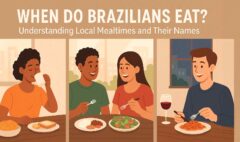Introduction to Brazilian Portuguese Expressions
Introduction to Brazilian Portuguese Expressions
Brazilian Portuguese is more than a set of grammar rules and vocabulary; it’s a vibrant tapestry of culture, history, and personality. Every twist and turn of the language reflects the spirit of Brazil’s diverse population. Have you ever wondered why Brazilians sound so animated when they speak? It’s partly because of the colorful expressions they use daily. Think of these expressions as the secret ingredients that give Brazilian Portuguese its unique flavor—like adding a dash of hot sauce to a dish. By understanding these everyday sayings, you’ll not only learn the language but also connect more deeply with Brazil’s soul.
The Cultural Roots of Brazilian Portuguese
Portuguese Colonial Influence
To appreciate the depth of Brazilian Portuguese, you have to go back in time—way back, to when Portuguese explorers arrived in the land we now call Brazil. Over centuries, the language has evolved from a strict Portuguese framework into something distinctly Brazilian. You can think of it as a garden that started with Portuguese seeds but flourished with new flowers after being influenced by local conditions. Much like any language that travels overseas, the resulting dialect and expressions grew organically, incorporating local slang, indigenous words, and African influences.
African and Indigenous Contributions
Many everyday expressions in Brazilian Portuguese have roots in African and Indigenous languages. These influences are woven into the country’s cultural fabric. For instance, the word “abacaxi” (pineapple) finds its origin in the Tupi-Guarani language. Similarly, certain rhythmic phrases and expressions trace back to African heritage, especially in regions like Bahia. The unique combination of these cultural threads offers a mosaic of expressions that ranges from formal phrases to the kind of slang you hear on the streets of Rio de Janeiro.
Importance of Slang and Informal Language
The Role of Slang in Everyday Conversations
Slang in Brazilian Portuguese is not some niche corner of the language; it’s right at the center of daily life. If you watch a Brazilian soap opera or overhear a casual chat at a local bar, you’ll notice words like “caraca,” “po,” and “tô ligado.” These terms might seem alien if you learned Portuguese solely through textbooks. Slang bridges the gap between formal language and real-life communication, allowing speakers to inject personality and humor into their interactions.
Blurring Lines Between Formal and Informal
One of the most fascinating things about Brazilian Portuguese is how people blend formal and informal language. Brazilians often switch between politeness and slang within the same sentence, especially among friends or close colleagues. It’s like mixing sweet and savory in a single dish—a perfect balance. This elasticity makes the language feel warm and expressive, but it can also trip up new learners. Once you get the hang of it, though, it feels incredibly natural.
Common Greeting Expressions
“Tudo bem?”
When you walk into a room full of Brazilians, you’ll probably hear “Tudo bem?” (“All good?”) more than any other phrase. It’s a universally accepted greeting that does double duty as a question about your well-being. Brazilians typically answer with “Tudo!” or “Tudo bem!” even if things are not entirely going smoothly—somewhat akin to saying “I’m fine” in English. It’s polite, it’s simple, and it’s basically your golden ticket to starting any conversation on the right note.
“Oi” and “Olá”
While “Oi” and “Olá” both translate to “Hi” or “Hello,” “Oi” carries a more casual tone. You might use “Olá” in more polite or formal situations—though it’s still quite friendly. If “Oi” is like a quick wave to a friend, “Olá” is a slightly more refined handshake. Don’t stress too much about it, though—Brazilians love a friendly approach, so even if you say “Oi” to your boss, chances are it won’t raise any eyebrows.
“E aí?”
“E aí?” literally means “And there?” but it’s really the Brazilian equivalent of “What’s up?” People use it to greet friends or acquaintances in a relaxed environment. Expect answers like “Beleza?” or “Tranquilo?”—both meaning something along the lines of “All good?” or “Chill?” It’s part of the laid-back vibe that Brazilians exude. If you’re feeling extra casual, toss in a nod or a thumbs-up for good measure.
Expressing Emotions and Surprises
“Nossa!”
“Nossa!” is a versatile exclamation that conveys amazement, shock, or even mild frustration. It’s short for “Nossa Senhora” (Our Lady), a religious reference that has become an everyday term. You might say “Nossa!” if someone tells you an unbelievable story or if you spot a breathtaking view. It’s the Brazilian version of “Wow!”—just shorter and packed with local flair.
“Caramba!”
“Caramba!” is another expletive that signals surprise, but it’s less formal than “Nossa!” and sometimes carries a tone of mild irritation or excitement. Imagine you just stubbed your toe, or you see your favorite football team score a jaw-dropping goal—“Caramba!” fits perfectly in both scenarios. It’s almost like a toned-down version of stronger expletives, making it acceptable to use in most social settings without raising eyebrows.
“Poxa!”
“Poxa!” often indicates disappointment or sympathy. If your friend tells you they missed a big opportunity, you might respond with “Poxa!” to show you feel for them. It’s somewhat like “Oh, man!” in English. It can also express mild surprise, but generally, it leans toward empathy or regret. It’s not harsh, so you can say it around older folks or in polite company without offending anyone.
Polite Expressions and Courtesies
“Obrigado” vs. “Obrigada”
No lesson on Brazilian Portuguese expressions would be complete without clarifying “Obrigado” and “Obrigada.” The difference is simple: men say “Obrigado,” women say “Obrigada.” It’s based on the speaker’s gender, not the person you’re speaking to. However, don’t panic if you mix them up occasionally—Brazilians are generally forgiving, and they appreciate any attempt at politeness.
“Com licença” and “Por favor”
“Com licença” means “Excuse me” or “With your permission,” used when you need to get through a crowded space or interrupt someone. Meanwhile, “Por favor” is your standard “Please.” Both are essential for anyone trying to navigate daily life in Brazil, whether you’re ordering a coffee, asking for directions, or trying to board a packed bus. Think of them as the passports that help you move through social situations gracefully.
“Desculpa” vs. “Foi mal”
“Desculpa” is a polite way to say “I’m sorry,” similar to “Sinto muito.” “Foi mal” is more casual, equivalent to “My bad.” You might say “Desculpa” if you accidentally bump into someone or genuinely feel remorseful, while “Foi mal” is perfect for smaller infractions, like being late to meet a friend. Brazilians will appreciate you using either phrase instead of ignoring the mistake altogether.
Everyday Idiomatic Phrases
“Ficar de olho”
Literally translated, “Ficar de olho” means “to keep an eye on,” but Brazilians use it to advise caution or attention. Imagine your friend telling you to watch your belongings in a busy market; they’d likely say, “Fica de olho nas suas coisas!” It’s a gentle reminder to stay alert, and it’s used in every corner of the country, from bustling cities to sleepy beach towns.
“Matar saudade”
“Matar saudade” is a poetic way of saying “to kill the longing” or “to quench nostalgia.” When you miss someone dearly, you might say you want to “matar saudade” by seeing them again. It’s a sentimental expression that reveals the emotional depth of Brazilian Portuguese. After all, “saudade” itself is a famously untranslatable word that combines longing, nostalgia, and love all in one.
Slang Terms That Define Brazilian Culture
“Beleza?”
“Beleza?” is a versatile slang term that can mean “Is everything beautiful?” or simply “All good?” It’s often used interchangeably with “Tudo bem?” but carries a slightly more laid-back tone. If someone asks you “Beleza?” you can respond with “Beleza!” or “Tranquilo!” Picture it like a quick fist bump in the form of a word.
“Valeu!”
“Valeu!” literally means “It was worth it,” but in slang usage, it’s an informal way of saying “Thanks!” It’s short, it’s sweet, and it’s entirely Brazilian. You might also hear it as a way to end a conversation—like a breezy “Cool, thanks!” in English. If you’re in Rio and someone gives you directions, a simple “Valeu!” shows your gratitude in a friendly way.
“Partiu”
“Partiu” is a fun expression that translates to “Departed” or “Left,” but in slang form, it means “Let’s go!” or “I’m out!” It’s often accompanied by a shrug or a gesture toward the door. Imagine a group of friends deciding to head to the beach; one might say, “Partiu praia?” meaning “Shall we go to the beach?” It captures the spontaneous, adventurous spirit many Brazilians share.
Regional Expressions Across Brazil
Northeastern Expressions
Brazil is massive, so it’s no surprise that each region has its own linguistic quirks. In the Northeast, you might hear “Oxente!”—a term that conveys surprise or exasperation. It’s similar to “Nossa!” or “Caramba!” but is specific to that region. The Northeast is also known for mixing in African influences, resulting in a rich vocabulary that sets it apart from the rest of the country.
Southern Variations
Head to the South, and you’ll encounter terms like “Bah!” or “Tchê!” which reflect strong Gaúcho traditions influenced by neighboring countries like Argentina and Uruguay. People there have a distinctive accent and love chimarrão (a type of mate tea), which also finds its way into local expressions. These variations show how geography and history shape the language in each region.
Unique Accents and Dialects
From the rolling hills of Minas Gerais to the urban sprawl of São Paulo, you’ll hear different accents and dialects. While the vocabulary might not drastically change, the intonation and speed can vary significantly. Some regions drop the “s” at the end of words, while others might roll the “r” in a distinct way. This diversity is a testament to Brazil’s cultural richness, making every trip across the country a linguistic adventure.
Food and Culinary Expressions
“Bora comer”
“Bora comer” literally means “Let’s go eat,” but it’s more of a rallying cry for mealtime. Brazilians take their food seriously, and gatherings often revolve around sharing a hearty meal. Whether it’s feijoada (a black bean and pork stew) or freshly grilled fish, food is a huge part of life in Brazil. So the next time someone says “Bora comer,” expect a feast.
“Churrasco”
“Churrasco” is Portuguese for “barbecue,” but it’s not your run-of-the-mill grilling session. In Brazil, a churrasco is a social event, featuring various cuts of meat cooked on skewers over an open flame. It often lasts for hours, with friends and family dropping by, eating, chatting, and sipping on refreshing drinks. This tradition isn’t just about food—it’s about the celebration of community, which inevitably inspires a slew of unique expressions related to grilling and good times.
Musical Influence on Language
Samba and Bossa Nova
Music courses through Brazilian veins, influencing speech and expressions. Samba and Bossa Nova are not just musical genres; they’re lifestyles that embody joy, sensuality, and longing. You may find lyrics from famous songs creeping into everyday conversations, becoming slang or idiomatic expressions. If someone says a phrase like “É só o começo” (It’s just the beginning), it might be a nod to a well-known lyric, illustrating how deeply music shapes the language.
Funk and Hip-Hop
Modern funk and hip-hop scenes in places like Rio de Janeiro and São Paulo have spawned a fresh wave of slang. Words emerge and gain popularity through social media and local dance culture. These expressions often reflect the struggles and victories of urban life, connecting with younger generations who use them to express identity, creativity, and rebellion. Whether you’re into the infectious beats or not, you’ll likely pick up some street slang by listening to these genres.
Body Language and Gestures
The Famous ‘Thumbs Up’
In Brazil, a thumbs-up sign is a universal gesture of approval. It’s the body-language equivalent of saying “Ok!” or “Beleza!” You’ll see it everywhere—from kids showing off a good soccer kick to businessmen closing a deal. It’s so common that sometimes Brazilians don’t even say anything; a simple thumbs-up does the talking for them.
The “Ok” Hand
Making a circle with your thumb and index finger is understood as “Ok” in many cultures. In Brazil, it generally means the same, although be mindful that in certain contexts or regions, it may be considered slightly rude or too casual if used in formal settings. Still, most Brazilians interpret it as a sign of agreement or confirmation, especially in laid-back environments.
Formal vs. Informal Address
“Você” vs. “Senhor/Senhora”
Unlike some other Romance languages, Brazilian Portuguese rarely uses “Tu” in everyday speech—although you’ll hear it in certain areas, such as the South or parts of the Northeast. “Você” is the most common way to say “you,” but if you’re speaking to someone much older or in a position of respect, “Senhor” (Mr.) or “Senhora” (Mrs./Ms.) is more polite. It’s a subtle distinction that goes a long way in showing courtesy.
When to Use “Tu”
“Tu” still pops up in casual conversations, especially in certain states like Rio Grande do Sul, Santa Catarina, or in some Northeastern states. If you plan on traveling to these regions, be prepared to hear it and perhaps even use it. Just keep in mind that the associated verb conjugations often get mixed with “você” forms, creating a unique linguistic hybrid that locals can navigate easily but might confuse newcomers.
Tips for Mastering Brazilian Portuguese Expressions
Immersion and Practice
The best way to learn any language is to jump in headfirst. Spend time with native speakers, watch Brazilian TV shows, listen to local music, and try to converse whenever you can. Even reading social media comments in Portuguese can offer a treasure trove of everyday slang and expressions. Treat it like learning to dance—you can read all about the steps, but until you actually move, you won’t become a pro.
Cultural Sensitivity
Some expressions might seem harmless to you, but they could carry unexpected connotations in Brazilian culture. Always observe context and social cues. Brazilians are generally laid-back, but showing respect for their norms will endear you to them even more. If you’re unsure about using a particular phrase, it never hurts to ask a local friend, “Posso falar isso?” (Can I say this?).
Online Resources and Language Apps
Plenty of online resources can help you polish your Brazilian Portuguese. From language-learning apps like Duolingo and Babbel to YouTube channels devoted to Brazilian culture, you have an ocean of tools at your fingertips. Just remember to balance digital learning with real-world practice—nothing beats a genuine conversation in boosting your fluency.
Conclusion
Final Thoughts on Embracing Brazilian Portuguese
Brazilian Portuguese expressions are as colorful as the country’s landscape, weaving together influences from Europe, Africa, and indigenous peoples. Once you dive into the slang, idioms, and local quirks, you’ll discover that learning the language becomes less of a chore and more of a captivating adventure. It’s like peeling back layers of an onion—each new expression reveals something deeper about the Brazilian spirit.
Keeping the Language Alive
Language is a living entity that thrives on everyday use. By embracing Brazilian Portuguese expressions, you become part of the ongoing story of this vibrant culture. So go ahead, toss around a few “Nossa!” and “Beleza?” in your next conversation. Don’t worry about getting everything perfect from the start—Brazilians will appreciate the effort and enthusiasm, and you’ll build lasting connections along the way.
FAQs
- Is it necessary to master all Brazilian expressions to speak fluently?
Not at all. You can communicate effectively with basic Portuguese skills, but learning popular expressions makes your conversations more natural and fun. - What’s the best way to pick up new slang or expressions?
Immerse yourself in Brazilian media—music, TV shows, and social platforms. Listen closely to native speakers and try out the words in real conversations. - Why do some Brazilians use “Tu” while others don’t?
It depends on the region. Southern and some Northeastern areas use “Tu” more frequently, often mixed with “você” conjugations. - Are there polite alternatives to slang in formal settings?
Yes, you can opt for standard expressions like “Tudo bem?” instead of “Beleza?” and “Muito obrigado” instead of “Valeu!” depending on the level of formality. - Can I mix Portuguese from Portugal with Brazilian Portuguese?
You can, but be aware of key differences in pronunciation, vocabulary, and expressions. Brazilians will usually understand European Portuguese, but some words or accents might sound unfamiliar.
Learn Portuguese the Brazilian Way! 🇧🇷✨
At The Brazilian Ways, we believe language learning should be fun, immersive, and deeply connected to culture. Our unique courses help you speak Portuguese naturally while experiencing Brazil through its music, films, literature, and dance.
🎶 The Brazilian Music Club – Learn Portuguese through the rhythm and lyrics of Brazilian music.
🎬 The Movie Club – Improve your Portuguese while exploring the best of Brazilian cinema.
📖 The Short Story Club – Enhance your skills by diving into Brazilian literature.
💃 Portuguese for Zouk – Connect with the Zouk dance community while learning Portuguese.
✨ Join a vibrant community of learners and experience Brazil through language!
👉 Explore our programs and start today! 🚀
📲 Follow us on Instagram for more engaging content, language tips, and cultural insights: @thebrazilianways













